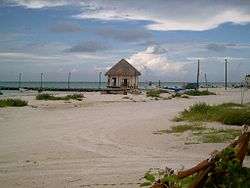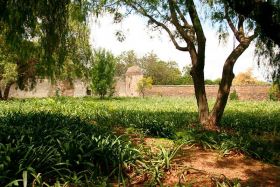What are Rights of Possession in Mexico and why is this so important for me to know?
John Venator - Casa de los Venados
 One thing you have to learn in Mexico is that unequivocally, the title of the house is free and clear. You definitely want to spend money to get a good lawyer to do the title search on the property. We have a friend who bought one and a half pieces of a house that is a block away from us that had been divided into five pieces. One of the relatives who owned the house had totally free and clear title to it and the other half that they were buying was actually owned by two sisters. The one...
One thing you have to learn in Mexico is that unequivocally, the title of the house is free and clear. You definitely want to spend money to get a good lawyer to do the title search on the property. We have a friend who bought one and a half pieces of a house that is a block away from us that had been divided into five pieces. One of the relatives who owned the house had totally free and clear title to it and the other half that they were buying was actually owned by two sisters. The one... One thing you have to learn in Mexico is that unequivocally, the title of the house is free and clear. You definitely want to spend money to get a good lawyer to do the title search on the property. We have a friend who bought one and a half pieces of a house that is a block away from us that had been divided into five pieces. One of the relatives who owned the house had totally free and clear title to it and the other half that they were buying was actually owned by two sisters. The one sister was selling it but the other sister had to sign off of it; otherwise, they wouldn’t get clear title.
One thing you have to learn in Mexico is that unequivocally, the title of the house is free and clear. You definitely want to spend money to get a good lawyer to do the title search on the property. We have a friend who bought one and a half pieces of a house that is a block away from us that had been divided into five pieces. One of the relatives who owned the house had totally free and clear title to it and the other half that they were buying was actually owned by two sisters. The one sister was selling it but the other sister had to sign off of it; otherwise, they wouldn’t get clear title. The worst thing that happened on the west coast of Mexico in the Baja, which made the news, was when a huge gated community was built on a land that is used as a cooperative community land, but in fact, they had no right to sell to the developer in the first place. Unfortunately, all the people who bought in that development literally lost their houses. So you want to make sure that you have clear title.
We have some friends near where we used to live who were renting but they wanted to buy a property. They found this complex of eight town houses but it did not have clear title. All that the owner wanted to give them to sell the property was a note saying, “If and when, you ever get free title, I am saying that I no longer have an interest in that and you will have an interest in it if and when you get a free title.” So they didn’t buy there. They bought in someplace else.
Clear and free title can definitely be a problem here because you may find, especially in older properties, that some other relative owns a piece of it or it can be land which is land that is owned by the whole community, which no individual has the right to sell.
There is no title insurance in Mexico per se but there is a certification or a statement from the company that says that the property you are buying has clear title. The lawyer who did the transaction in terms of buying the property also looks at it and confirms that that company has verified the clear title.
(Celebration at Casa de los Venados, Valladolid, Yucatan, Mexico, pictured.)
Posted September 29, 2015
Carmella Peters Romero - Peters & Romero
 Mexico does enforce the rights of possession for property owners, and foreigners are able to buy property anywhere in the country with clear title. This was not always the case as foreigners were at one time not permitted to own land within 60 miles of the coast or a national border. However, a few years ago the law was changed and foreigners are now able to purchase land in these formerly restricted zones through the use of a special trust called a Fideicomiso.
Mexico does enforce the rights of possession for property owners, and foreigners are able to buy property anywhere in the country with clear title. This was not always the case as foreigners were at one time not permitted to own land within 60 miles of the coast or a national border. However, a few years ago the law was changed and foreigners are now able to purchase land in these formerly restricted zones through the use of a special trust called a Fideicomiso.  Mexico does enforce the rights of possession for property owners, and foreigners are able to buy property anywhere in the country with clear title. This was not always the case as foreigners were at one time not permitted to own land within 60 miles of the coast or a national border. However, a few years ago the law was changed and foreigners are now able to purchase land in these formerly restricted zones through the use of a special trust called a Fideicomiso.
Mexico does enforce the rights of possession for property owners, and foreigners are able to buy property anywhere in the country with clear title. This was not always the case as foreigners were at one time not permitted to own land within 60 miles of the coast or a national border. However, a few years ago the law was changed and foreigners are now able to purchase land in these formerly restricted zones through the use of a special trust called a Fideicomiso. All foreigners must receive authorization from the Ministry of Foreign Affairs in order to purchase property – the process is very straight-forward and it is very unlikely that an application would be denied.
In order to establish title to a property, you simply need to go through the process of registering your property through a notary. In Mexico, a notary is a little different than what most Canadians and Americans would expect – they are lawyers who receive extra training and certification by the government, and the entire profession along with the services they offer and the fees they charge are tightly regulated. It is the notary who will conduct the necessary due diligence to ensure that you have clear title to any property you purchase before a deed is signed. I have been working in the real estate business here in Mexico for 5 years now and I have never encountered anybody who had a problem with title.
(Townhouse in Puerto Vallarta, Mexico, pictured.)
Posted November 13, 2015
Ivan Castillo - Secure Title Riviera Maya
 There are several ways in which you can have the right to possess a property in Mexico.
There are several ways in which you can have the right to possess a property in Mexico. One method is through you being the owner. You are in physical possession of the property and as a consequence you have the right to use, enjoy, and exploit and do whatever you want with your property.
You can have possession through other means such as a lease agreement, so even though that you have physical possession through a lease agreement that...
 There are several ways in which you can have the right to possess a property in Mexico.
There are several ways in which you can have the right to possess a property in Mexico. One method is through you being the owner. You are in physical possession of the property and as a consequence you have the right to use, enjoy, and exploit and do whatever you want with your property.
You can have possession through other means such as a lease agreement, so even though that you have physical possession through a lease agreement that doesn’t give you ownership.
There is another arrangement here in Mexico called Ejido Land whereby the government designates a group of people to use, enjoy, rent a parcel and that parcel that is granted to these group of individuals, which are called the Ejidatario Group, which live on the land, but the land is owned by the government. The Ejidatario have the right of possession to use and rent the property. However, they don’t have the right to sell because they are not the owners. The owner is the government.
(Beach on the island of Isla Holbox, Rivera Maya, Mexico, pictured.)
Posted January 25, 2016
Ian T. Clement - Clement and Associates
 In Mexico, the system was set up in a way to protect the unprotected as much as possible after the revolution in 1910-1917. Rights of possession were set up so that if you have 10,000 acres of land, and some serf needs to carve out a tiny little plot in order to be able to survive, he’s allowed to do that. If somebody has been living on your property for 5 years, and it’s fully known by everybody, then they can move in and have the papers extended to them.
In Mexico, the system was set up in a way to protect the unprotected as much as possible after the revolution in 1910-1917. Rights of possession were set up so that if you have 10,000 acres of land, and some serf needs to carve out a tiny little plot in order to be able to survive, he’s allowed to do that. If somebody has been living on your property for 5 years, and it’s fully known by everybody, then they can move in and have the papers extended to them. ...
 In Mexico, the system was set up in a way to protect the unprotected as much as possible after the revolution in 1910-1917. Rights of possession were set up so that if you have 10,000 acres of land, and some serf needs to carve out a tiny little plot in order to be able to survive, he’s allowed to do that. If somebody has been living on your property for 5 years, and it’s fully known by everybody, then they can move in and have the papers extended to them.
In Mexico, the system was set up in a way to protect the unprotected as much as possible after the revolution in 1910-1917. Rights of possession were set up so that if you have 10,000 acres of land, and some serf needs to carve out a tiny little plot in order to be able to survive, he’s allowed to do that. If somebody has been living on your property for 5 years, and it’s fully known by everybody, then they can move in and have the papers extended to them. How often does it really happen in Mexico? Very seldom, but there definitely is a perception that it’s easy for a squatter to become a nightmare to you here in Mexico. If you have property with a good wall or a good fence, and you nip the situation right in the bud, then you’re fine. Where I see rights of possession situations getting ugly for people is when people who have a servant who lived on their property for a long time decide that they don’t want that servant living on their property anymore, but don’t have a contract or anything in place that legally binds them to the situation or allows them to exit the situation. As long as strong contracts are in place, and due diligence is done in all situations, there’s nothing to worry about there.
The constitution that Mexico operates under now was certainly set up in order to at least in deed, protect the rights of the unprotected, which any ethical constitution should have language that speaks in that direction.
But I think that people’s worries about being compromised by rights of possession are exaggerated and I, having run this office for quite a few years, see so little of that. It’s such a small part of what I would say my client’s problems are, so it’s not a big issue, but it’s certainly something that you don’t want to be cavalier about, either. It’s not as though you’d buy a few acres and say, “Hey, everybody just come and camp out!” Being smart is really the bottom line here- doing what you need to do and delineating what property is yours. Good fences make good neighbors so that’s always something about which one needs to be conscious.
(Hacienda outside of San Miguel de Allende, Mexico, pictured.)
Posted December 17, 2016



.png)